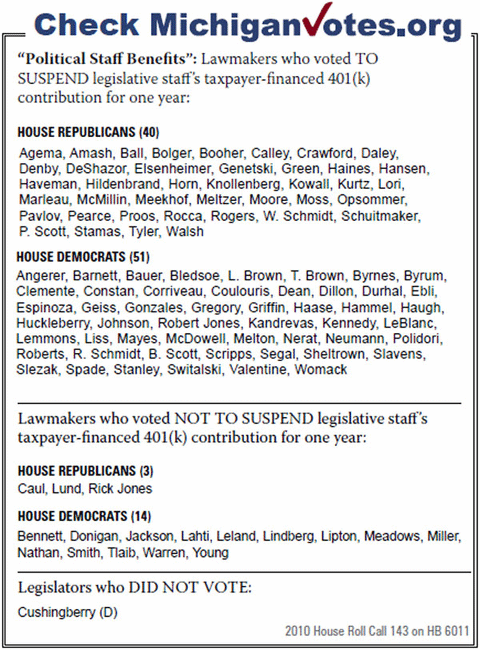House Votes to Temporarily Trim Political Staff Benefits
A bill that would temporarily trim the taxpayer-provided 401(k) matching payments for employees of the Michigan Legislature was overwhelmingly approved on April 21, on a vote of 91-17. Just three Republicans voted against the measure, along with 14 Democrats. A similar proposal that applies to the lawmakers themselves was approved on a vote of 99-9, with Democrats providing all nine "no" votes.
The 401(k) retirement accounts of full-time legislative employees currently receive two forms of subsidy from taxpayers:
- An annual and automatic supplement equal to 4 percent of the employee's salary, regardless of whether the employee voluntarily provides any funding at all to their own retirement account; and
- An additional supplement that can equal up to another 3 percent of salary. This is a dollar-for-dollar match, available only if the employee elects to contribute to their own 401(k) account from their own paycheck. (Workers may contribute more than 3 percent of their own money, but the dollar-for-dollar match does not apply beyond that point.)
House Bill 6011 would suspend the 3 percent matching payment benefit for one year, but would continue the four percent of salary automatic contributions. House Bill 6012 would make a roughly similar change for lawmaker 401(k) plans. If these become law, the Michigan House Fiscal Agency estimates a total one year savings of $1 million.
Lawmakers are currently trying to close a projected gap of $1.7 billion between the spending they'd currently prefer to make for the next fiscal year and the tax dollars that they anticipate having available.
The "Pension Rights Center" has tabulated more than 300 large public and private American employers that have announced the suspension of at least part of their supplemental 401(k) payments and/or matching contributions since 2008. In each case, these announcements state concerns about the need to remain financially viable during the difficult economic times that have been confronting the nation. Mecklenburg County in North Carolina and a New Jersey public transit authority are two of the most recent, and earlier ones have touched every corner of the American workforce. Examples include: FedEx; General Motors; JP Morgan; American Express; the PGA Tour; Lincoln, Neb.; a teacher's union local in Massachusetts; the Corporation for Public Broadcasting; Kelly Services; the Grand Rapids Symphony; and Michigan-based furniture-makers Steelcase and Herman Miller.
Last summer, the Lincoln Journal-Star in Lincoln, Neb., reported that the mayor and some city council members were getting an earful about the retirement matching payments to that city's public employees.
"They're asking why our tax dollars are financing retirements that they themselves can't," said the mayor to the newspaper, quoting the concerns of his constituents.
Rep. Fred Miller, D-Mt. Clemens, is one of the 17 in the Michigan House to vote against House Bill 6011. He characterized the 3 percent matching payment for legislative employees as only a "meager" benefit, but that its temporary suspension would nonetheless risk "potentially jeopardizing" their retirement security. Miller further noted that legislative employees should be unionized so that they can better protect their benefits from the lawmakers who supervise them.
Rep. Pete Lund, R-Shelby Township, also voted against suspending the benefit, one of three Republicans to do so. The MIRS newsletter (subscription only) says that Lund voted "no" because "legislative staffers are non-union workers who would be shouldering a significant cut in benefits at a time when union workers are receiving a 3 percent raise on Oct. 1."
This is in reference to a pay raise that had been negotiated by the Democrat governor's administration. The state constitution requires that negotiated raises take effect unless a super-majority of both chambers in the Legislature vote to reject them. The Michigan Senate made repeated attempts this spring to gain the needed super-majority, but failed each time. The Michigan House made no attempts. The deadline to reject has expired, and the raise will go into effect with an estimated additional cost to the taxpayers of more than $77 million over the next fiscal year.
The other Republicans to reject suspending the matching payments for the legislative workers were Rep. Rick Jones of Oneida and Bill Caul of Mt. Pleasant. Each of them and Lund did vote for House Bill 6012, which suspended the matching payments for the lawmakers.
The MichiganVotes.org roll call for House Bill 6011 is reproduced below.
Contact information for lawmakers is available here.
The original version of this story was posted online on May 5, 2010.
Michigan Capitol Confidential is the news source produced by the Mackinac Center for Public Policy. Michigan Capitol Confidential reports with a free-market news perspective.

